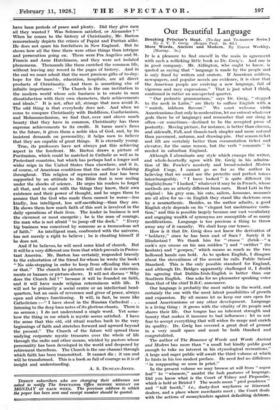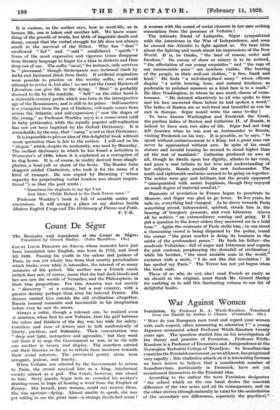Our Beautiful Language
Breaking Priscian's Head. (To-day and To-morrow Series.) More Words, Ancient and Modern. By Ernest Woekley. (Murray. 5s.)
IT is a pleasure to find oneself in the main in agreement with such a rollicking little book as Dr. Greig's. And one is in good company. Mr. Aldington, who ought to know, is quoted as saying that " language is made by the people and is only fixed by writers and orators. If American soldiers, newspapers, and popular novels are evidence, it is clear that the American people are evolving a new language, full of vigorous and racy expressions." That is just what I think confirmed in rather an unexpected quarter.
Our pedantic grammarians," says Dr. Greig, " stogged to the neck in Latin," are likely to suffuse English with a " wairsh, inkhorn flavour." We must welcome virile Americanisms (but only in moderation, let me entreat whatever gods there be of language) and remember that our slang is often—or sometimes—destined to be the accepted prose of posterity. Moving picture, for instance, is better than cinema, and sidewalk, Fall, and thumb-tack simpler and more natural than pavement, autumn, and drawing-pin. Our season-ticket and lift are certainly better than commutation ticket and elevator, for the same reason, but the verb " commute " is needed in suburban England.
Although I abominate any style which cramps the writer, and whole-heartedly agree with Dr. Greig in his admira- tion of Mr. Fowler's masterly and broad-minded Modern English Usage, I cannot go so far as the author in believing that we could use the preterite and perfect tenses interchangeably. " I have looked " is quite different (in English) from " I looked," whatever it may be in French, whose methods are so utterly different from ours. Read Loti in the original : his grey seas, his cats, sailors, hanoums, mousmes are all alive for us—in English they stand like skeletons seen by a neurasthenic. Besides, as the author admits, a good English style depends on its "elegant but unobtrusive varia- tion," and this is possible largely because our vast vocabulary and engaging wealth of synonyms are susceptible of so many modifications. Language is too precious a thing to throw away any of it casually. We shall keep our tenses.
How is it that Dr. Greig does not know the derivation of " bobbery," since he has been east of Suez ? Surely it is Hindustani ? We thank him for " croose " (brisk—" a cock's aye croose on his aan midden ") and " swither " (to hesitate) and " gowpen," which means as much as the two hollowed hands can hold. As to spoken English, I disagree about the slovenliness of the accent he calls Public School Standard. This is the only possible standard for England, and although Dr. Bridges apparently challenged it, I doubt his agreeing that Dublin-Irish-English is better than our Southern English. One asks for no pleasanter speaking voice than that of the chief B.B.C. announcer.
Our language is probably the most subtle in the world, and certainly the one with the most latent possibilities of growth and expansion. By all means let us keep our ears open for sound Americanisms or any other development. Language is a living thing : it grows with the vitality of its people and shares their life. Our tongue has an inherent strength and beauty that makes it immune to bad influences : let us not
fear to accept everything that will widen its range and enrich its quality. Dr. Greig has covered a great deal of ground in a very small space and must be both thanked and congratulated.
The author of The Romance of Words and Words Ancient and Modern has more than " a small but kindly public good enough to take an interest in his etymological recreations." A large and eager public will await the third volume at which hz hints in his too modest preface. He need feel no diffidence " in reappearing so soon in print."
In the present volume we may browse at will from " aspen leaf " to " wiseacre," amidst the lush pastures of language. Did you know what is the Court of Tolzey and Piepoudre, which is held at Bristol ? The words mean " pied poudreux " and " toll booth," i.e., dusty-foot wayfarers or itinerant dealers, and a place where merchants meet ; the Court deals with the actions of moneylenders against defaulting debtors.
. 64
It is curious, as the author says, how in word-life, as in
human life, one is taken and another left. We know some- thing of the growth of words, but little of linguistic death and decay, except that the verbal struggle for life does not always result in the survival of the fittest. Why has " dear " swallowed " lief " and " said " annihilated " quoth " ? Some of the most expressive and vigorous terms disappear from literary language to linger for a time in dialects and then drop out of use. The suffix "meal," for instance, only survives in " piecemeal," though Shakespeare uses inchmeal (inch by inch) and limbmeal (limb from limb). If artificial respiration were possible to practise on this worthy suffix, we would attempt to revive it, but alas ! no one but the Great Masters of Literature can give life to the dying. " Meal " is probably doomed to die by the roadside. " Self " on the other hand is a sixteenth-century prefix which was born in the introspective age of the Renaissance, and is still in its prime. Self-assertive is a youngster from the pen of Dickens, self-made comes from across the Atlantic, and self-expression (" now the slogan of the young," as Professor Weekley says) is a nonce-word (still in baby petticoats), while the equally popular self-realization has not yet been baptized by the Oxford Dictionary. It is remarkable, by the way, that" vamp" is not in that Dictionary.
It is impossible to give an idea of this delightful book without more quotation than is fair to the author. I will end on his " slogan," which, despite its modernity, was used by Macaulay. The earliest dictionary in which he has found a definition is Worcester's of 1860, where it is explained as a corruption of to slug home. It is, of course, in reality derived from sluagh- ghairm, a host-yell or shout of the Scots. The Border form sloggorn misled Chatterton, who took it for the name of a kind of trumpet. He was copied by Browning (" whose capacity for perpetrating verbal howlers was almost inspira- tional ") so that the poet wrote :
"Dauntless the alughorn to my lips I set
And blew, Child° Roland to the Dark Tower came.' " Professor Weekley's book is full of amiable asides and excursions. It will occupy a place on my shelves beside Modern English Usage and The Dictionary of Phrase and Fable.
F. Y-B.







































 Previous page
Previous page